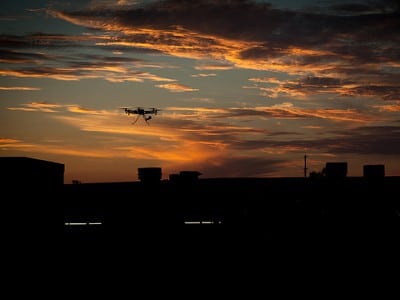For prisons, drones are like Santa Claus delivering toys at Christmas

 More recreational drones than ever before are expected to show up under the tree this Christmas, with the Consumer Electronics Association predicting a 64% increase in sales over 2014 figures, totaling 700,000 unit sales by the end of this year.
More recreational drones than ever before are expected to show up under the tree this Christmas, with the Consumer Electronics Association predicting a 64% increase in sales over 2014 figures, totaling 700,000 unit sales by the end of this year.
But if you happen to be stuck in jail waiting for a gift to arrive from the outside, drones are likely to play the role of Santa Claus this year, dropping off valuable goods such as cigarettes, small weapons, drugs or cell phones.
Two days ago, La Presse reported that a drone was used to deliver a handgun to the Rivière-des-Prairies prison just east of Montreal, and that prison authorities were unaware of the delivery until the following day.
Previous to April 2014, zero drone delivery incidents were reported in U.K. prisons, but since then nearly 30 drones have been recovered from prisons across England and Wales.
Yesterday, though, just in time for the holiday season, the U.S. Federal Aviation Administration announced that all small unmanned aircraft (UAS), or drones, weighing between 0.55 lbs. and 55 lbs. are to be registered by February 19, 2016.
The FAA’s registration rule applies retroactively, so anyone in the United States who now owns a drone will still have to register.
Drones registered during the first month will see their $5 aircraft registration fee refunded.
Bothered by the problem of prison drone incidents, the FBI put out a Request for Information in November to look into purchasing some anti-drone tech to prevent unmanned vehicles from making deliveries, or from surveilling secure sites such as prisons.
A German company called Dedrone, founded in 2014, develops a DroneTracker security system, using daytime and nighttime optical sensors, as well as acoustic sensors, to provide real-time protection against unwanted drone intrusion.
“Drone technology is evolving so quickly that it’s very hard for prisons to keep up with the latest risks,” says Dedrone co-founder Joerg Lamprecht. “Creating 24×7 protection against drone drops that can happen under the cover of darkness, or through drones disguised to look like other objects is a top priority for many facilities and one they are trying to act against quickly. Facilities would be smart to evaluate drone detection technologies that will help them detect the presence of drones, and enable them to enact protective countermeasures to maintain tight security.”
However the authorities respond to the problem of drones, whether for recreational purposes or for organized crime, it’s an issue that’s set to get bigger and bigger, necessitating an ever-widening net of security tech designed for intercepting drones.
Or they could just do like the Japanese police, who are now deploying a charmingly clunky drone fisherman whose job it is to catch unauthorized drones in flying nets.

Terry Dawes
Writer

